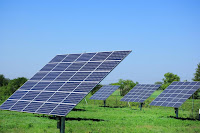
You have friends or acquaintances who are cynical when it comes to taking care of the planet. Maybe they give lip-service regarding some dedication to "good stewardship" of what has been mercifully bestowed upon them, but the real-life everyday application of that stewardship appears more like a simple desire to maximize the size and protection of their own hoard. Mention recycling or energy conservation or a meeting of the Sustainable Resources Coalition in your area and you see the skepticism rush to their face. My question is, what do you think of that person's empathy in general? Does that person tend to have much concern about the difficulties or disadvantages experienced by anyone outside his or her very immediate circles?
If you could spend more than a few minutes with me in real life, you would find that I have not yet made many transformations in my own life toward "being green," and you would find that my general empathy does not yet reflect in real-life much more depth than that of your friend who came to mind in the previous paragraph. But my brain is definitely taking preparatory steps to kick me into gear.
This newly released book by Jeremy Rifkin, The Empathic Civilization, links the hope for a healthy planet to civilization's maturing empathy. In sampling fashion, I have discovered Rifkin's work via an online article adapted from the new book. So I haven't read it all, but beyond the article, I also read a review and the book's promotional bits and I therefore feel that I am grasping the gist well enough to recommend it to you as interesting.
Everyone knows that in recent years, our communications capabilities and information access have vastly improved our "connection" to the rest of our world's inhabitants. Rifkin posits that the groundwork is laid for what has become a very necessary revolution...the extension of empathic sensibilities to our biosphere and all of the living organisms that exist within it. It is not enough to simply acknowledge a general interest in being less wasteful and being more careful. An "empathic civilization" will require that we all actively work together to harvest and share renewable energy. It will require that we actually start caring about our neighbors and also future generations of neighbors who might otherwise be devastated by our inactivity in the present moment.
Take a few moments to look into this notion and see if it stirs you toward biosphere consciousness and an improved, matured empathy:
"When every family and business comes to take responsibility for its own small swath of the biosphere by harnessing renewable energy and sharing it with millions of others on smart power grids that stretch across continents, we become intimately interconnected at the most basic level of earthly existence by jointly stewarding the energy that bathes the planet and sustains all of life. ...A younger generation is fast extending its empathic embrace beyond religious affiliations and national identification to include the whole of humanity and the vast project of life that envelops the Earth." - Rifkin CLICK HERE FOR THE ARTICLE
If you could spend more than a few minutes with me in real life, you would find that I have not yet made many transformations in my own life toward "being green," and you would find that my general empathy does not yet reflect in real-life much more depth than that of your friend who came to mind in the previous paragraph. But my brain is definitely taking preparatory steps to kick me into gear.
This newly released book by Jeremy Rifkin, The Empathic Civilization, links the hope for a healthy planet to civilization's maturing empathy. In sampling fashion, I have discovered Rifkin's work via an online article adapted from the new book. So I haven't read it all, but beyond the article, I also read a review and the book's promotional bits and I therefore feel that I am grasping the gist well enough to recommend it to you as interesting.
Everyone knows that in recent years, our communications capabilities and information access have vastly improved our "connection" to the rest of our world's inhabitants. Rifkin posits that the groundwork is laid for what has become a very necessary revolution...the extension of empathic sensibilities to our biosphere and all of the living organisms that exist within it. It is not enough to simply acknowledge a general interest in being less wasteful and being more careful. An "empathic civilization" will require that we all actively work together to harvest and share renewable energy. It will require that we actually start caring about our neighbors and also future generations of neighbors who might otherwise be devastated by our inactivity in the present moment.
Take a few moments to look into this notion and see if it stirs you toward biosphere consciousness and an improved, matured empathy:
"When every family and business comes to take responsibility for its own small swath of the biosphere by harnessing renewable energy and sharing it with millions of others on smart power grids that stretch across continents, we become intimately interconnected at the most basic level of earthly existence by jointly stewarding the energy that bathes the planet and sustains all of life. ...A younger generation is fast extending its empathic embrace beyond religious affiliations and national identification to include the whole of humanity and the vast project of life that envelops the Earth." - Rifkin CLICK HERE FOR THE ARTICLE
No comments:
Post a Comment